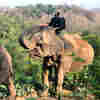
Elephants eat leaflet during Botswana’s Mashatu diversion haven in 2010.
Cameron Spencer/Getty Images
hide caption
toggle caption
Cameron Spencer/Getty Images
Elephants eat leaflet during Botswana’s Mashatu diversion haven in 2010.
Cameron Spencer/Getty Images
Botswana’s supervision is lifting a anathema that stable a elephants from being hunted, partial of a array of decisions that could have durability impacts on a country’s charge efforts.
In a minute to reporters, a Ministry of Environment, Natural Resources Conservation and Tourism referred to elephants as predators and pronounced their numbers “appear to have increased.” It pronounced a subcommittee found that conflicts between humans and elephants had risen, harming stock and a livelihoods of Botswana’s people.
The proclamation noted a pointy depart from a policies of former President Ian Khama, who dangling elephant competition after information showed a race in decline. The anathema took outcome in 2014 though did not stop competition in purebred diversion ranches.

In May, Botswana’s newly inaugurated president, Mokgweetsi Masisi, done general headlines for giving 3 African leaders stools done of elephant feet.
In June, he requested a examination of a anathema on competition elephants.
His investigate organisation endorsed “regular though singular elephant culling,” in further to substantiating elephant beef canning for pet food and other products. Among other conclusions, it endorsed a supervision enhance Botswana’s safari competition industry.
Authorities pronounced Thursday that a supervision supposed all recommendations solely a unchanging culling of elephants and a investiture of beef canning. “This was deserted since culling is not deliberate excusable given a altogether continental standing of elephants. Rather, a some-more tolerable process such as resourceful gathering should be employed,” a supervision said.
Conservationists around a universe took to amicable media to malign a government’s annulment on elephant hunting.
“Horrific over imagination,” Paula Kahumbu, CEO of a Kenya-based WildlifeDirect. She pronounced competition was an primitive approach to residence a problems of vital with mega fauna. “Africa, we are improved than this,” she tweeted.
German classification Pro Wildlife wrote that competition was a bloody sport, “#cruel, outdated, reprobate and mostly undermining” conservation.

Other groups distinguished Botswana’s announcement, including Safari Club International, a U.S.-based classification that supports regulated prize hunting.
President Paul Babaz called it “heartening” in a statement. “These commentary clearly uncover that competition bans indeed harm wildlife conservation; competition is a pivotal to providing a required income to account anti-poaching efforts and on-the-ground charge research,” he said.
Fewer than 400 elephant licenses will be postulated annually, a supervision of Botswana announced on Twitter Thursday. It pronounced it was formulation for “strategically placed tellurian wildlife dispute fences” and remuneration for repairs caused by wildlife. All roving routes for animals that are not deliberate “beneficial” to Botswana’s charge efforts will be closed, including an antelope track to South Africa.
Northern Botswana is home to Africa’s largest elephant population, according to a U.S. Fish Wildlife Service. The race grew usually from 80,000 in 1996 to 129,000 in 2014.
It happened as medium detriment and poaching ravaged elephant populations opposite Africa. Between 2010 and 2012 alone, poachers slaughtered 100,000 African elephants, National Geographic reported.
Last September, a carcasses of 87 elephants were found tighten to a stable refuge in Botswana. They had been killed for their tusks.











